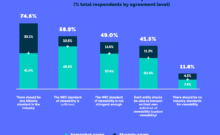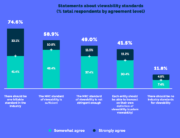The first banner ad was launched by AT&T in 1994, heralding the beginning of digital advertising. The industry has gone through many changes since then, the most profound of these being the rise of dominating search engines and social media sites – which among them accounted for the majority of digital advertising spend (excluding China) in 2017, according to research from GroupM. Writing exclusively for ExchangeWire, Craig Tuck, UK MD, RhythmOne, explains why, with the recent public backlash against these vast controllers of data, there is an opportunity for other, independent (more open) platforms to capture some of this media spend, provided they can react in the right way.
Whilst the dominating search engines and social media sites have been in ascendency, point solutions available on the market have been through a process of consolidation, with companies now offering competitive full-stack, end-to-end marketplaces. This consolidation has left some ad-tech firms in a strong position: now able to provide a scalable solution that is an appealing alternative for advertisers, they are placed to respond to the demands of advertisers and offer solutions that are distinct from those of the so called ‘walled garden’ super-majors.
Speaking recently in an interview with Campaign, Stephen Loerke, chief executive of The World Federation of Advertisers (WFA) identified transparency, viewability, brand safety, and ad fraud as being top of the agenda for CMOs. Effectively, they want value for money. If ad-tech firms listen to the market, they can position themselves to take advantage of this potential step change in the distribution of global digital advertising revenue.
Transparency
Brand owners and advertisers want a clear understanding of where their money is going. This is specifically relevant when discussing the cost of the media that is being purchased, and the tolls that intermediaries are exacting on these transactions. They have seen an ecosystem grow that was not accountable and they are clamouring for improvements.
Read More at The Original Article: www.exchangewire.com









